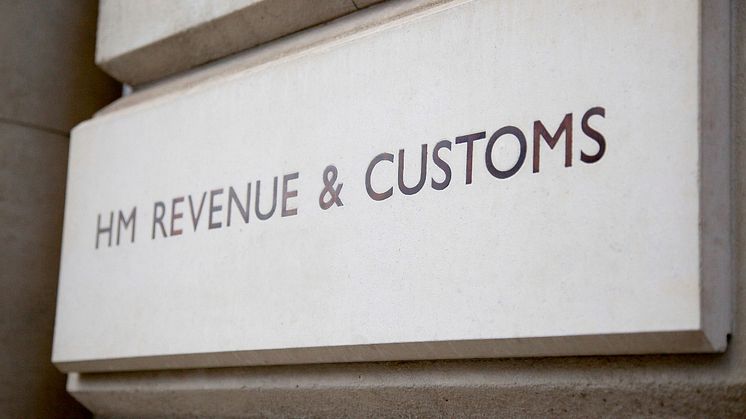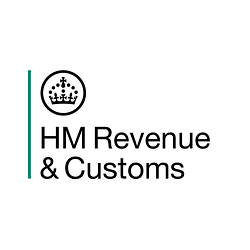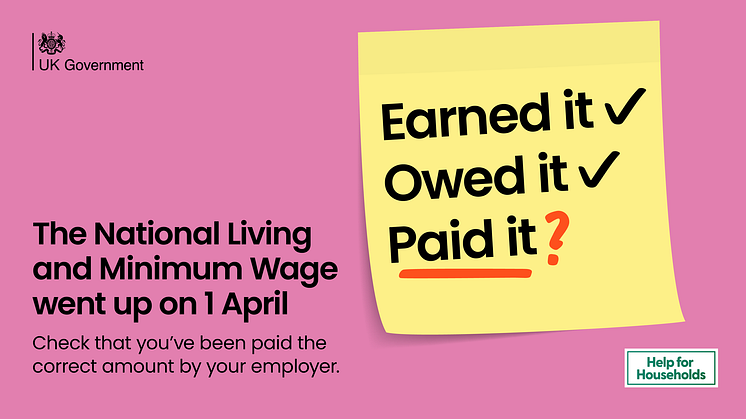
Press release -
HMRC reveals absurd excuses for not paying National Minimum Wage
While the vast majority of employers pay their employees at least the National Minimum Wage, HM Revenue and Customs (HMRC) has today released some of the most absurd excuses used for not paying the legal minimum.
Last year (2020 to 2021) HMRC helped more than 155,000 workers across the UK recover more than £16 million in pay which was due to them, and also issued more than £14 million in penalties.
Some of the most ridiculous excuses for flouting the law included:
- “She does not deserve the National Minimum Wage because she only makes the teas and sweeps the floors.”
- “The employee was not a good worker, so I did not think they deserved to be paid the National Minimum Wage.”
- “My accountant and I speak a different language – he does not understand me, and that is why he does not pay my workers the correct wages.”
- “My employee is still learning so they are not entitled to the National Minimum Wage.”
- “It is part of UK culture not to pay young workers for the first three months as they have to prove their ‘worth’ first.”
- “The National Minimum Wage does not apply to my business.”
- “I have got an agreement with my workers that I will not pay them the National Minimum Wage; they understand, and they even signed a contract to this effect.”
- “I thought it was okay to pay young workers below the National Minimum Wage as they are not British and therefore do not have the right to be paid it.”
- “My workers like to think of themselves as being self-employed and the National Minimum Wage does not apply to people who work for themselves.”
- “My workers are often just on standby when there are no customers in the shop; I only pay them for when they are actually serving someone.”
Steve Timewell, Director Individuals and Small Business Compliance, HMRC, said:
“The majority of UK employers pay their workers at least the National Minimum Wage, but this list shows some of the excuses provided to our enforcement officers by less scrupulous businesses. Being underpaid is no joke for workers, so we always apply the law and take action. Workers cannot be asked or told to sign-away their rights.
“We are making sure that workers are being paid what they are entitled to and, as the economy reopens, reminding employers of the rules and the help that is available to them.
“HMRC reviews every complaint made about the minimum wage, so if you think you are being short-changed, or are a business that is unsure of the rules or needs help to get things right, get in touch and we will help you. But any employer deliberately or unapologetically underpaying their staff will face hefty fines and other enforcement action.”
The National Minimum Wage hourly rates are currently:
- £8.91 - Age 23 or over (National Living Wage)
- £8.36 - Age 21 to 22
- £6.56 - Age 18 to 20
- £4.62 - Age under 18
- £4.30 - Apprentice.
HMRC is reminding workers to check the hourly rate of pay they are actually getting, and to also check any deductions or unpaid working time, as part of the Government’s commitment to build back fairer from the pandemic.
Anyone not being paid what they are entitled to can complain online at https://www.gov.uk/minimum-wage-complaint. If they want to speak with someone, in confidence, they should phone the Acas Pay and Work Rights Helpline on 0300 123 1100, who can transfer the call to HMRC.
Employers can also contact the Acas Helpline for free help and advice or visit https://www.gov.uk/guidance/calculating-the-minimum-wage to find out more.
Notes for Editors
1. Further information about the National Minimum Wage, including who is eligible, is available on GOV.UK at:
- https://www.gov.uk/guidance/calculating-the-minimum-wage
- https://www.gov.uk/national-minimum-wage/who-gets-the-minimum-wage
- https://checkyourpay.campaign.gov.uk/
And on the Acas website at: www.acas.org.uk/pay-and-wages.
2. HM Revenue and Customs (HMRC) is responsible for the enforcement of, and compliance with, the National Minimum Wage Act. The Department for Business, Energy and Industrial Strategy (BEIS) is responsible for National Minimum Wage (NMW) and National Living Wage (NLW) policy.
3. National Minimum Wage hourly rates (from 1 April 2021) are:
- Age 23 or over (National Living Wage): £8.91
- Age 21 to 22: £8.36
- Age 18 to 20: £6.56
- Age under 18: £4.62
- Apprentice: £4.30.
4. By law workers must be paid at least the minimum wage for their age. Information about how to complain or raise concerns can be found on GOV.UK: https://www.gov.uk/minimum-wage-complaint
5. Employers who do not pay the NMW can be publicly ‘named and shamed’. The most recent list was published by BEIS on 5 August 2021. Those who blatantly fail to comply can face criminal prosecution, but most employers pay up when they realise mistakes have been made.
6. You are entitled to the apprentice rate if you are an apprentice aged:
- under 19
- 19 or over and in the first year of your apprenticeship.
If you are 19 or over and have completed the first year of your current apprenticeship, you are entitled to the minimum wage for your age.
Find out more at: https://checkyourpay.campaign.gov.uk/#are_you_an_apprentice_
7. The two most common causes of minimum wage underpayment are deductions and unpaid working time. Examples include:
- Expenses for tools or equipment needed for the job
- Cost of uniform or clothing connected with the job
- Travelling time between work locations
- Training time.
8. Employers can get help and advice on paying the correct minimum wage from the Acas Helpline on 0300 123 1100 or from GOV.UK at:
https://www.gov.uk/guidance/calculating-the-minimum-wage
9. The Acas Pay and Work Rights Helpline is open Monday to Friday, 8am to 6pm. Calls are confidential, and the advice is free (0300 phone charges apply).
10. Follow HMRC’s Press Office on Twitter @HMRCpressoffice
Related links
- Complain about pay and work rights
- Calculating the minimum wage
- The National Minimum Wage and Living Wage
- The National Living Wage and National Minimum Wage
- Acas - Pay and wages
- HM Revenue & Customs
- Department for Business, Energy & Industrial Strategy
- Press release Employers ‘named and shamed’ for paying less than minimum wage
- Are you an apprentice?
Topics
Categories
Issued by HM Revenue & Customs Press Office
HM Revenue & Customs (HMRC) is the UK’s tax authority.
HMRC is responsible for making sure that the money is available to fund the UK’s public services and for helping families and individuals with targeted financial support.



